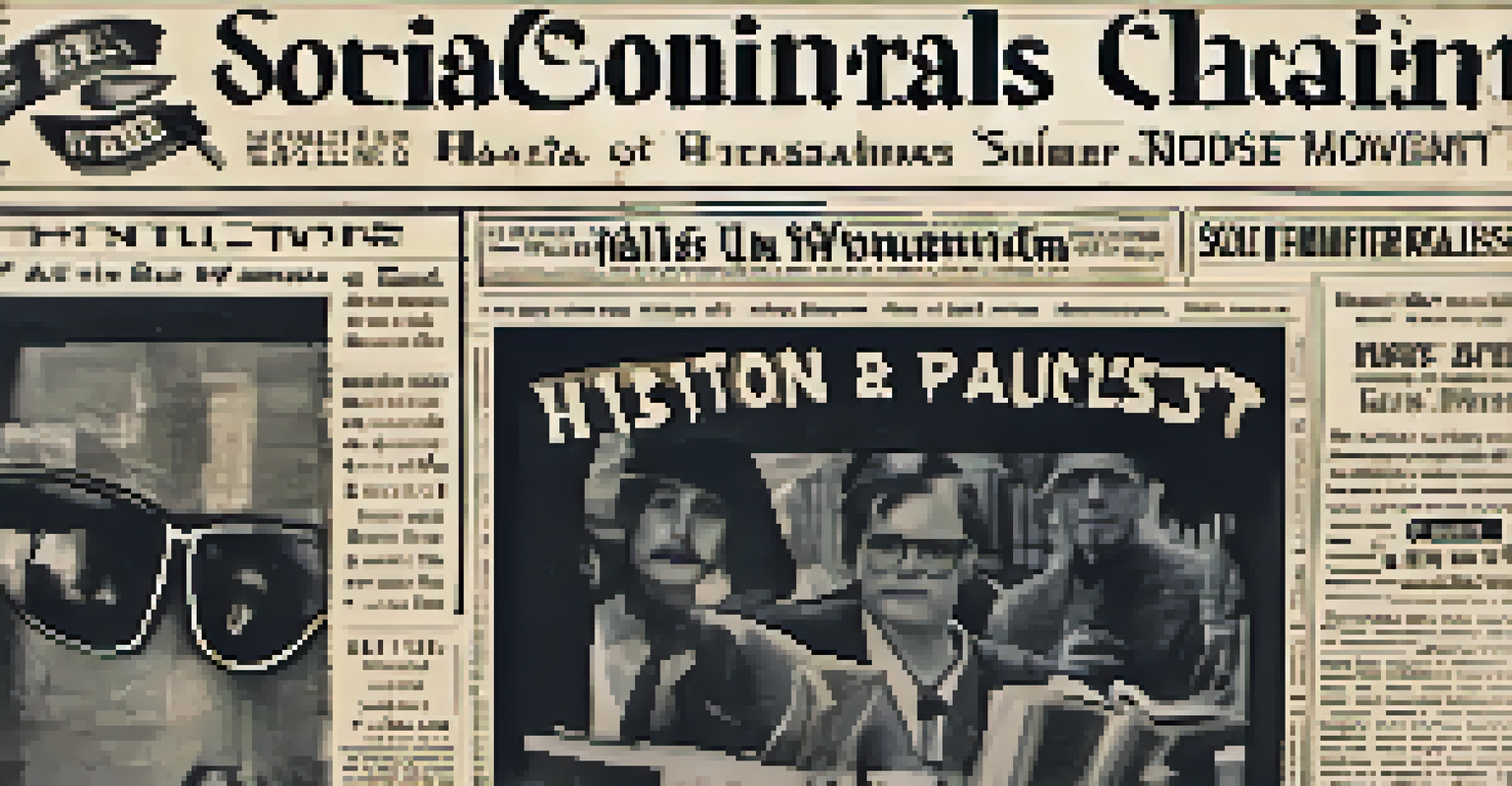Historical Newspapers: A Window into the Past for Researchers

Understanding Historical Newspapers and Their Value
Historical newspapers are more than just ink on paper; they are vital records of societal events and cultural shifts. They provide a snapshot of daily life, revealing the thoughts, concerns, and values of people from different eras. For researchers, these publications serve as primary sources that offer unique insights into the past.
Newspapers are the first draft of history.
Imagine peering into a time capsule where each page tells a story about politics, social movements, or even fashion trends of the day. This wealth of information allows researchers to understand historical context and the progression of ideas over time. By analyzing the language and narratives within these newspapers, scholars can gain a deeper appreciation of how history unfolds.
Moreover, historical newspapers can help fill gaps left by other records, providing a more rounded perspective on events. They can highlight local stories that might be overlooked in textbooks, showcasing the voices of ordinary people. This makes them invaluable tools for anyone looking to paint a comprehensive picture of the past.
Navigating Digital Archives for Historical Newspapers
With the advent of technology, accessing historical newspapers has become easier than ever. Many institutions and libraries have digitized their collections, making them available online for researchers worldwide. This means that you can explore archives from the comfort of your own home, opening up endless possibilities for discovery.

Digital archives often come equipped with search functions that allow users to find specific articles or topics quickly. For instance, if you’re researching women’s rights movements, typing in relevant keywords can yield a trove of articles discussing rallies, speeches, and public sentiment around that time. This user-friendly access transforms the way researchers interact with historical data.
Historical Newspapers as Primary Sources
They provide invaluable insights into societal events, cultural shifts, and the values of different eras.
While digital archives are fantastic resources, researchers should also consider visiting physical libraries or historical societies. These locations often house unique collections, including rare newspapers that may not be available online. The tactile experience of flipping through old pages can also provide a unique connection to the past.
Analyzing Content: What Historical Newspapers Reveal
The content found in historical newspapers is rich with information that can reveal societal norms and values of the time. From advertisements to opinion pieces, each element can be dissected for clues about what was important to people. For example, the prevalence of certain advertisements can indicate the economic climate and consumer trends of the era.
The past is never dead. It's not even past.
Editorials and letters to the editor are also fascinating avenues for analysis. They often provide insight into public opinion on pressing issues, revealing what topics stirred debate or concern among the populace. This can be particularly useful for understanding social movements or changes in political ideologies over time.
Additionally, the language used in articles can reflect the political climate and cultural attitudes of the time. Analyzing the tone and word choice can help researchers understand how certain events were perceived and how they impacted the community. This depth of analysis is what makes historical newspapers an essential resource for any research endeavor.
The Role of Newspapers in Major Historical Events
Historical newspapers often play a crucial role in documenting significant events, such as wars, elections, and social movements. They serve not only as records of what happened but also as platforms for public discourse. For example, during the Civil Rights Movement, newspapers were instrumental in shaping public opinion and rallying support for change.
By examining the coverage of these pivotal events, researchers can gain insights into the prevailing attitudes and reactions of the time. This can help contextualize how events were understood by the public and how they influenced future developments. For instance, analyzing reports on the suffrage movement can reveal how societal views on gender roles evolved.
Digital Archives Enhance Accessibility
The digitization of historical newspapers allows researchers to easily access vast collections from anywhere.
Furthermore, newspapers often include firsthand accounts and interviews that provide a personal perspective on historical events. These narratives can humanize abstract concepts, allowing researchers to connect with the past on a deeper level. This blend of factual reporting and personal stories enriches our understanding of history.
Preserving Historical Newspapers for Future Generations
As valuable as historical newspapers are, their physical preservation is critical for ensuring they remain accessible for future research. Many newspapers face deterioration due to aging paper and environmental factors. Institutions dedicated to archiving these documents often use specialized techniques to prolong their life, such as climate control and digitization.
Digital preservation is particularly significant, as it allows for the safeguarding of content that may otherwise be lost. By converting physical newspapers into digital formats, we ensure that future generations can access this wealth of information. It also minimizes wear and tear on the original documents, preserving their integrity.
Moreover, initiatives to promote public awareness about the importance of preserving historical newspapers are vital. Engaging the community in preservation efforts can foster appreciation for these resources and encourage support for libraries and institutions dedicated to archival work. This collective effort will help ensure that the stories of our past continue to be told.
Challenges Faced in Researching Historical Newspapers
Despite their value, researching historical newspapers isn't without its challenges. One common issue is the inconsistency in newspaper formats and publication practices across different regions and time periods. This can make it difficult for researchers to find reliable information or compare data across various sources.
Additionally, some newspapers may have biased reporting or limited coverage based on the publisher's perspective. This means that researchers need to approach their sources with a critical eye, considering the context and potential biases that may influence the information presented. Cross-referencing multiple sources can help mitigate this issue.
Challenges in Newspaper Research
Researchers face hurdles like inconsistent formats, potential biases, and overwhelming volumes of information.
Lastly, the sheer volume of available newspapers can be overwhelming. With countless issues published over decades, narrowing down relevant articles can be a daunting task. Researchers often benefit from utilizing specific strategies, such as focusing on particular themes or events, to streamline their search and make the process more manageable.
The Future of Researching Historical Newspapers
The future of researching historical newspapers looks promising, especially with advancements in technology and archival methods. Innovations in artificial intelligence and machine learning are being explored to enhance search capabilities within digital archives. This could allow researchers to uncover hidden connections and patterns within large datasets more efficiently.
Moreover, as more institutions digitize their collections, the accessibility of historical newspapers will continue to grow. This democratization of information means that researchers from various backgrounds can engage with the past without geographical limitations. It also encourages diverse perspectives in historical research, enriching the field overall.

Ultimately, the ongoing efforts to preserve and enhance access to historical newspapers will ensure that these valuable resources remain a vital part of research for years to come. As we continue to uncover the stories of our past, historical newspapers will undoubtedly play a pivotal role in shaping our understanding of history.